| Sunday March 30, 2025 EDT | |
| a nomad in search of... | |
Studio-type Yoga classesStudio-Type Yoga SeriesYoga classes typically offered in Yoga Studios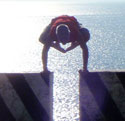 Sept 4, 2014
Sept 4, 2014
Adhitthana Yoga (Yoga of Strong Determination)Adhitthana Asana (Poses) The Real Challenge Benefits
I LIGHT WARM UP STRETCH
II Heat Movement
III Adhitthana Surya Namaskar Poses 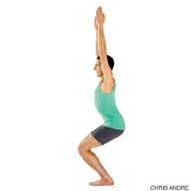 Surya Namaskar to chair pose (Utkatasana) Surya Namaskar to chair pose (Utkatasana)hold for 10 breaths or until failure  continue the Surya Namaskar until jumping back into plank continue the Surya Namaskar until jumping back into plankhold for 10 breaths or until failure  very slowly lower down into Four-Limbed Staff (Chaturanga) very slowly lower down into Four-Limbed Staff (Chaturanga)5 breaths while going down until you reach the low point  continue into Upward Dog (Urdhva Mukha Svanasana) continue into Upward Dog (Urdhva Mukha Svanasana)hold for 5 breaths while getting extablished into the pose  continue into Downward Dog (Adho Mukha Svanasana) continue into Downward Dog (Adho Mukha Svanasana)hold for 10 breaths 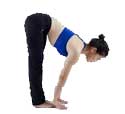 continue into Standing Half Forward Bend (Ardha Uttanasana ) continue into Standing Half Forward Bend (Ardha Uttanasana )hold for 5 breaths finish the rest of the Surya Namaskar IV Adhitthana Core Poses 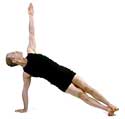 Surya Namaskar to upper plank, move body weight to left hand and roll over to the right side for side plank (Vasisthasana) Surya Namaskar to upper plank, move body weight to left hand and roll over to the right side for side plank (Vasisthasana)hold for 10 breaths or until failure. Back to center and repeat on the other side. 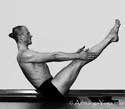 continue the Surya Namaskar until Downward Dog, and jump through the hands directly into boat pose (Navasana) continue the Surya Namaskar until Downward Dog, and jump through the hands directly into boat pose (Navasana)hold for 10 breaths or until failure. Cross legs and lift the body up and back into Navasana. Repeat 3x.  transition into Dandasana then go to bridge (Setu Bandha Sarvangasana / Purvottanasana) transition into Dandasana then go to bridge (Setu Bandha Sarvangasana / Purvottanasana)hold for 10 breaths or until failure. V Adhitthana Backbend Poses  transition into Dandasana then go into a forward bend, release, cross legs and jump into plank, lower all the way down, body flat on the mat. Inhale and do locust (Salabhasana) transition into Dandasana then go into a forward bend, release, cross legs and jump into plank, lower all the way down, body flat on the mat. Inhale and do locust (Salabhasana)hold for 10 breaths or until failure. 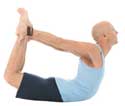 with the body still flat against the mat, bend knees and grab the ankles with both hands, knees hip-width apart. Inhale lifting the chest and knees, belly against the mat into bow pose (Dhanurasana) with the body still flat against the mat, bend knees and grab the ankles with both hands, knees hip-width apart. Inhale lifting the chest and knees, belly against the mat into bow pose (Dhanurasana)hold for 10 breaths or until failure. Release and go into Dandasana, then transition into a seated forward bend for counter pose. 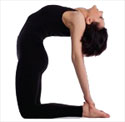 kneel down, toes tucked-in, knees hip-width apart, thighs perpendicular to the floor, pressing the feet firmly against the mat. Rest your hands on the top part of the buttocks fingers pointed down and start leaning back. Release one hand and hold onto the heels. Do the same with the other hand. If this is too easy, press the top of the feet against the floor instead. Push the pelvis to the front and push the chest up to the ceiling for camel pose (Ustrasana) kneel down, toes tucked-in, knees hip-width apart, thighs perpendicular to the floor, pressing the feet firmly against the mat. Rest your hands on the top part of the buttocks fingers pointed down and start leaning back. Release one hand and hold onto the heels. Do the same with the other hand. If this is too easy, press the top of the feet against the floor instead. Push the pelvis to the front and push the chest up to the ceiling for camel pose (Ustrasana)hold for 10 breaths or until failure. Release and go into Dandasana, then transition into a seated forward bend for counter pose. 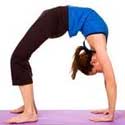 lie flat on the back, bend the knees until you can grab the ankles, feet hip width apart. Inhale and lift the chest and belly as high as they go into a wheel pose (Urdhva Dhanurasana) lie flat on the back, bend the knees until you can grab the ankles, feet hip width apart. Inhale and lift the chest and belly as high as they go into a wheel pose (Urdhva Dhanurasana)hold for 10 breaths or until failure. Release and go into Dandasana, then transition into a seated forward bend for counter pose. VI Adhitthana Arm Balances 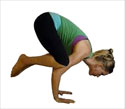 find yourself in Downward Dog and move the feet closer to the hand and do the crow (Bakasana) find yourself in Downward Dog and move the feet closer to the hand and do the crow (Bakasana)hold for 10 breaths or until failure. VII Adhitthana Inversions 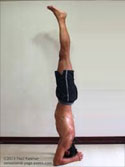 find yourself in Downward Dog, kneel down, cup the hands and proceed to headstand (Salamba Sirsasana) find yourself in Downward Dog, kneel down, cup the hands and proceed to headstand (Salamba Sirsasana)hold for 10 breaths or until failure. Release and stay in Child's Pose. 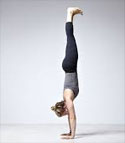 use a wall as very few people can do unsupported handstand, let alone doing a 'strong determination' handstand. Kick up the wall into headstand (Adho Mukha Vrksasana) use a wall as very few people can do unsupported handstand, let alone doing a 'strong determination' handstand. Kick up the wall into headstand (Adho Mukha Vrksasana)hold for 10 breaths or until failure. VIII Closing into Final Corpse Pose 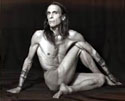 this is not really a pose for Adhitthana but a good seated twist to close the session. Seated, do half lord of the fishes (Ardha Matsyendrasana) this is not really a pose for Adhitthana but a good seated twist to close the session. Seated, do half lord of the fishes (Ardha Matsyendrasana)hold for 10 breaths. Do the other side.  we close the session by lying face up on our mats, hands stretched to the sides, palms face-up, feet dangling to the sides for corpse pose (Savasana) we close the session by lying face up on our mats, hands stretched to the sides, palms face-up, feet dangling to the sides for corpse pose (Savasana)stay here until the breath normalizes. Session ends here. --- TheLoneRider FYI / Tips
Yoga-Sequence Series
Reader Comments:  Jason Jason (Sept 4, 2014) ...very interesting
»» next story: Manila Blues Scene ARCHIVE 2025:
JAN |
FEB |
MAR
|

 Family-Owned and Managed Davao Hotel 
 Scuba Diving Apo Island  Scuba Diving Apo Island 
 Coron Island Property for Sale Busuanga, Palawan  Island Hopping Tours Coron, Palawan  Outdoor Adventure Tours
Outdoor Adventure Tours
 SandCastles Palawan Beach Resort
SandCastles Palawan Beach Resort

 Outdoor Adventure Tours  Boracay Beach Hotel 
 |